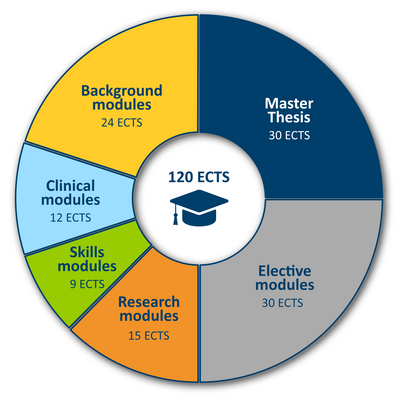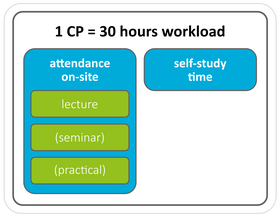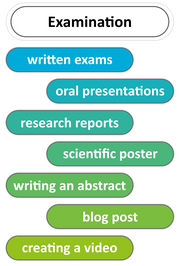Contact
For questions concerning the programme
Advice and support
General Information
Degree: Master of Science (M.Sc.)
Language: English (B2)
Duration: 4 semesters full-time
ECTS: 120 CP
Commencement: October
Each year capacity: 25 students
Structure of the programme

The master program Molecular Biomedicine takes 4 full-time semesters and has an overall workload of 120 CP. Over the time of 2 years, students individually select their modules from three major categories. Except for the master thesis, there are no mandatory modules, which gives students the opportunity to specialize themselves according to their personal interests. However, a specific amount of CP has to be done in from each of the categories: Background modules – 24 CP, Clinical modules – 12 CP, Skills modules – 9 CP. Additional 30 CP are selected individually from the list of modules or even from another master’s program like M.Sc. Biology or M.Sc. Neuroscience.
On top of that, students will complete an individual research project, which can be organized together with one of the research groups at the university (external research projects can also be done). The students individually get into contact with the research groups they are interested in and plan their laboratory work together with the supervisors.
To finish the degree program, students take the master thesis module. Similar to the research project, the master thesis includes practical work in the laboratories of one of the research groups. The individual project will be concluded by the written master thesis as well as an oral presentation of the research to the group of the supervisors. With a total workload of 30 CP, the master thesis is supposed to more or less fill the 4th semester.
ECTS and Modules

ECTS stands for "European Credit Transfer and Accumulation System" and provides a base to monitor the accomplishment of students. The workload of students is measured in form of "credit points" (CP). 1 CP stands for a total workload of 30 hours. A course that is worth 6 CP, demands 180 hours of work, which is devided into attendance time and individual study time. Individual study means for example the preparation for a course, studying for the exam or preparing an oral presenation.
The courses are called modules. Modules consist of several units (like lecture and practical) that together build the course. To complete a module, all subunits have to be successfully attended.
Examinations

The master’s degree program includes different types of examinations. Depending on the type of course, the students’ scientific and clinical specialized knowledge is mainly assessed by written or oral exams. In the various practical parts of the courses, students get the chance to work in the laboratories and summarize the methods and results in small lab reports. In this context, scientific literature is consulted, and the experimental results are classified. Interdisciplinary skills are also assessed by other types of examinations, for example preparing a scientific poster, creating a small video, or writing a term paper.
Research modules test the students’ expertise to work independently in the laboratory over several weeks and the results are put together in a research report. The master thesis module also includes independent laboratory work as well as the written master thesis and an oral presentation of the results in front of the supervisors.
Internships
The Study and Career Counselling Service facilitates access to internships in Germany and abroad, provides practice-related contacts, maintains a database of businesses, and advises students on the preparation and funding of their internship.
In order to expand students’ possibilities for building a profile based on their individual interests, inclinations and career aspirations, modules amounting to 30 CP may be selected from other degree programmes, such as the M.Sc. in Neuroscience and the M.Sc. in Biology. In addition, modules may be completed at other universities or institutions for higher education in or outside Germany. As a whole, the modules should reflect a main focus. The open structure of the degree programme takes into account the fact that the complexity of biomedical research requires an interdisciplinary approach. A stay abroad is facilitated by the possibility of obtaining 30 CP externally. An entire semester can therefore be spent studying abroad, as 30 CP corresponds to the credits that can be obtained in a semester. The second and third semesters are particularly suitable for this. Further options consist of taking the External Research Project Molecular Biomedicine module (gsw160) worth 15 CP, in which an individual research project is carried out at another university or research institution in Germany or abroad. In addition, the bi-national model degree programme Human Medicine of School VI - Medicine and Health Sciences allows for studies in cooperation with the European Medical School Oldenburg-Groningen (NL). The degree programme complies with the Lisbon Convention, thus ensuring the recognition of qualifications in higher education in the European region.
Background Modules (24 CP)
These modules will expand your knowledge in fundamental research topics.
| bio605 | Molecular Genetics and Cell Biology | 12 |
| bio695 | Biochemical Concepts in Signal Transduction | 12 |
| gsw010 | Molecular Physiology | 6 |
| gsw020 | Cellular and Subcellular Structures | 6 |
| gsw030 | Biophysical Chemistry | 6 |
| gsw040 | Molecular and Cellular Biology of Hearing and Deafness | 12 |
| gsw050 | Current Topics in Genetics | 6 |
| neu141 | Visual Neuroscience: Physiology and Anatomy | 12 |
| neu150 | Visual Neuroscience: Anatomy | 6 |
| neu220 | Neurocognition and Psychopharmacology | 6 |
| gsw230 | Molecular Pharmacology | 6 |
| gsw240 | Basic Immunology in Health and Disease | 6 |
| gsw250 | Molecular Microbiology | 6 |
| gsw260 | Molecular Virology | 6 |
| gsw270 | Introduction to Human Anatomy | 3 |
Clinical Modules (12 CP)
The module contents are medicine related and teach you in several medical fields.
| gsw060 | Epigenetics and Gene Regulation | 6 |
| gsw070 | Gene-based Therapies in Human Diseases | 6 |
| gsw080 | Genetics Diagnostics: From Chromosomal Aberrations and Gene Mutations | 6 |
| gsw090 | Current Topics in Clinical Research | 6 |
| gsw100 | Immunology and Inflammation | 6 |
| gsw110 | Clinical Aspects of Degenerative Diseases | 6 |
| gsw120 | Tumor Biology | 6 |
| gsw130 | Regenerative Medicine in Ophthalmology | 6 |
Skills Modules (9 CP)
These modules are about diverse skills related to biomedical sciences.
| gsw170 | Research Techniques in Molecular Biomedicine | 6 |
| gsw180 | Ethics in Medicine | 3 |
| gsw190 | Journal Club | 3 |
| gsw200 | Microscopic Imaging in Biomedical Sciences | 3 |
| gsw210 | Scientific Communication | 6 |
| neu751 | Laboratory Animal Science | 3 |
| neu760 | Scientific English | 6 |
| gsw220 | Bioinformatics and Omics | 6 |
| gsw220 | Introduction to Academic Writing | 3 |
Elective Modules (30 CP)
You choose from any modules of the different categories that you are interested in. There is also the chance to take modules from related master programs like M.Sc. Neuroscience or M.Sc. Biology.
Research Module (15 CP) and Master Thesis (30 CP)
The reserach module is a mainly practical project that is planned individually with the lecturers. You expand your laboratory skills by working on an individual research project in the labs of our reserach groups. The project is finished with a written research report.
The master thesis module is characterized by a more extended practical research project. It also includes your written master thesis as well as an oral presentation of your work to the research group.
| gsw150 | Research Project Molecular Biomedicine | 15 |
| gsw160 | External Research Project Molecular Biomedicine | 15 |
| mam | Master Thesis Module | 30 |



![[Translate to English:]](/f/6/_processed_/0/e/csm_MolBiomed_LogoKreis_schwarz_8aae508b34.jpg)